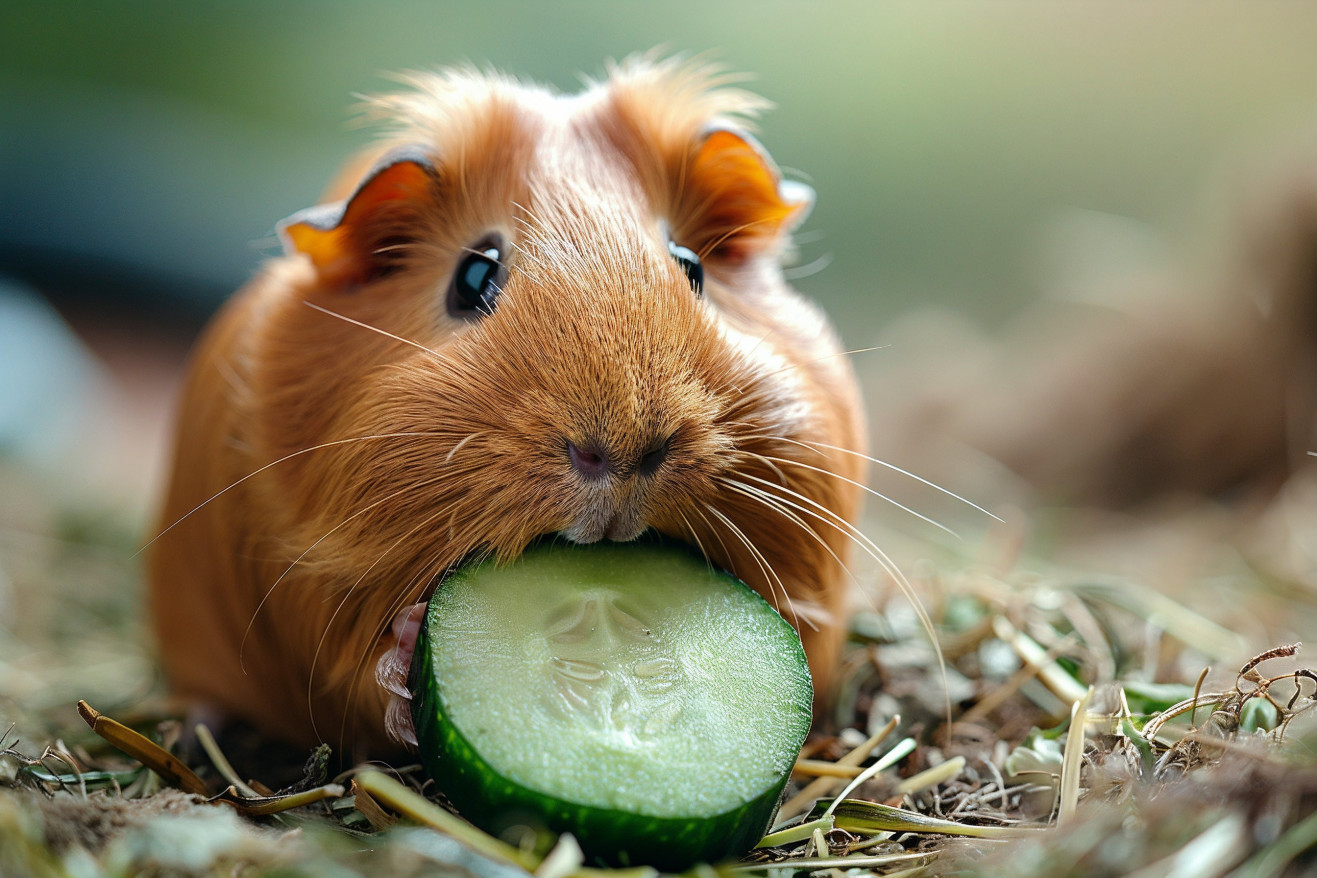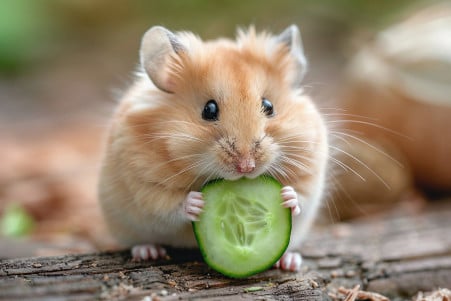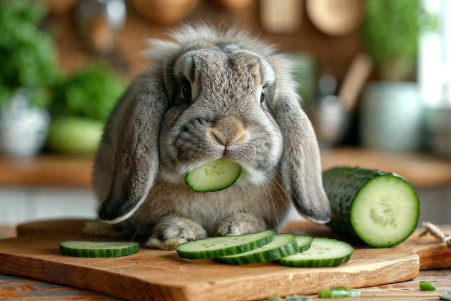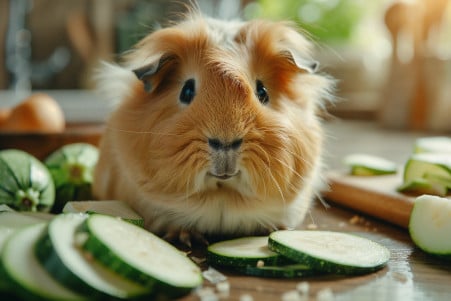Can Guinea Pigs Have Cucumbers? Nutritional Benefits and Feeding Tips
2 March 2024 • Updated 1 March 2024

Cucumbers are cool, crisp, and plentiful during the summer months, but are they safe for guinea pigs to eat? Yes, guinea pigs can eat cucumbers. These water-rich veggies can help keep your pet hydrated and provide important nutrients like vitamin C. That said, cucumbers are high in water, so they should be given in moderation to avoid tummy troubles.
This article will cover the nutritional and veterinary facts to help you better understand the benefits and potential drawbacks of adding cucumbers to your guinea pig’s diet. By the end, you’ll know the best ways to offer cucumbers to your pet, how much is too much, and why it’s important to make sure your guinea pig’s diet is as varied as possible.
Armed with this knowledge, you’ll be able to make sure your guinea pig’s diet is as healthy and well-rounded as possible, which will help them stay as healthy as possible.
Can guinea pigs have cucumbers?
Nutritional Value of Cucumbers for Guinea Pigs
In addition to being a cool, refreshing snack, cucumbers also provide guinea pigs with some important nutrients. A 2017 review of the nutritional composition of cucumbers published in PMC notes that cucumbers are 95% water, which means they can help guinea pigs stay well-hydrated. This is important because guinea pigs get water from both the food they eat and the water they drink.
Vitamin C is an essential nutrient that, like humans, guinea pigs can’t synthesize and must get from their diet. Cucumbers can help provide guinea pigs with this important nutrient. However, it’s important to note that while cucumbers contain vitamin C, they shouldn’t be the only source of it in a guinea pig’s diet because they contain less vitamin C than other vegetables.
While the high water content of cucumbers can help guinea pigs stay hydrated, it can also cause problems if they’re overfed. Overeating cucumbers can lead to digestive problems because of the water they contain. Medical News Today explains that cucumbers are high in cucurbitacin and fiber, which can be good for guinea pigs in small amounts but may cause digestive upset if they’re eaten in large amounts.
To make sure guinea pigs get the right balance of nutrients from their diet, it’s important to know the nutritional value of cucumbers and how to feed them to guinea pigs properly. When fed in moderation, cucumbers can be a nutritious and hydrating addition to a guinea pig’s diet.
Best Feeding Practices for Guinea Pigs
Creating a healthy diet for your guinea pig is important for their overall well-being. As the RSPCA Knowledgebase explains, high-fiber grass hay is the most important part of a guinea pig’s diet because it helps with digestion and keeps their teeth at the right length.
Fresh vegetables and fruits are also important because they help with hydration, and they provide vitamins and minerals, including vitamin C, which guinea pigs need to get from their diet because they can’t make it themselves.
The PDSA suggests that when you’re feeding your guinea pig cucumbers or any other new food, you should introduce it slowly to avoid upsetting their delicate stomach. When you first start feeding your guinea pig cucumbers, give them a small piece and see how they react. Then adjust the amount you give them based on their reaction.
It’s also important to make sure you’re feeding your guinea pig the right amount of cucumbers. You should only feed them cucumbers as a treat, and you should make sure they’re washed and cut into pieces that are an appropriate size for your guinea pig.
You should also make sure that you’re feeding them cucumbers in addition to their regular diet, not instead of it. Finally, you should make sure you’re feeding them cucumbers in moderation.
Because every guinea pig is different, it’s important to keep an eye on your guinea pig when you make any changes to their diet. This way, you can make sure that the changes are having a positive effect on their health.
If you do this, cucumbers can be a healthy addition to your guinea pig’s diet. They can help keep your guinea pig hydrated and contribute to their overall health, as GuineaPiggles points out.
However, it’s important to keep an eye on your guinea pig’s health when you make any changes to their diet because they can be sensitive to changes in what they eat.
How Guinea Pigs’ Digestive Systems Work
Guinea pigs have a unique digestive system that has evolved to handle a diet of tough, fibrous plants. Guinea pigs’ open rooted teeth grind fibrous plants, and their large caecum is home to bacteria that ferment fiber, allowing the release of nutrients.
This means that their digestive system is dependent on a specific nutrient profile, including the absorption of vitamin C, which is a critical nutrient that guinea pigs cannot produce and must get from their food.
While cucumbers’ high water content can help with hydration, it can also throw off the balance of their digestive system. According to Supreme Petfoods, even small changes in a guinea pig’s diet can lead to gastrointestinal problems. The fiber in cucumbers can help meet the guinea pig’s need for a fibrous diet, but it’s important to make sure that they don’t eat so much that it leads to digestive upset.
This can lead to common problems like diarrhea or constipation. However, these problems can often be managed through diet. By making sure that cucumbers are introduced to the guinea pig’s diet in a way that takes their water and fiber content into account, it’s possible to help ensure that they have a healthy digestive system.
However, it’s important to monitor the impact of any dietary changes on a guinea pig’s digestive system, as any signs of imbalance may mean that it’s time to see the vet to make sure that they’re healthy.
How to Spot and Manage Food Allergies in Guinea Pigs
Allergies and food sensitivities in guinea pigs can show up in a number of ways, including skin problems and digestive issues. In addition to food, common allergens include bedding, such as cedar shavings, which contain oils that can cause reactions, according to PetHelpful.
While not mentioned in the sources, it’s possible that similar reactions could happen with certain foods. This is why it’s important to introduce cucumbers to guinea pigs slowly so you can watch for any problems, according to Kavee Cage in their article on a balanced diet for guinea pigs.
GuineaDad also stresses the importance of a clean, allergen-free environment and recommends close monitoring when new foods like cucumbers are introduced. If your guinea pig has an allergic reaction to cucumbers, you should remove the food and contact a vet for help and advice.
By introducing cucumbers slowly and watching for any signs of a reaction, you can make sure your guinea pig can eat this hydrating treat without any problems. This vigilance will help you protect your guinea pig’s health and ensure that they can enjoy the benefits of cucumbers, including their hydrating properties, without any negative side effects.
Cucumbers and Hydration: How Much Water Do Guinea Pigs Need?
Water is an essential part of a guinea pig’s diet and is important for their overall health. Guinea pigs need to have fresh, clean water available to them at all times, and it should be changed daily to avoid bacterial growth, according to GuineaPiggles.
Cucumbers can help guinea pigs stay hydrated because they are made up mostly of water, which can be especially helpful in the summer when guinea pigs may be drinking more water than usual. However, it’s important to make sure that the water in cucumbers doesn’t replace the water that guinea pigs get from other sources.
According to Omlet, dry foods will make guinea pigs drink more water, while wet foods like cucumbers will make them drink less.
It’s important to keep an eye on how much water your guinea pig is drinking because changes in their water intake can be a sign of an underlying health issue.
Signs that your guinea pig is well-hydrated include drinking water regularly and urinating normally, while signs of dehydration include being lethargic, having sunken eyes, and a lack of skin elasticity.
If you notice any of these signs or if you notice that your guinea pig is drinking more water than usual, the Metropolitan Guinea Pig Rescue recommends that you take your pet to the vet. In conclusion, cucumbers can be a great way to help guinea pigs stay hydrated and cool, but they should never be a substitute for fresh, clean water.
In Conclusion: Cucumbers Can Be a Healthy Snack for Your Guinea Pig
In summary, cucumbers can be a healthy and helpful part of your guinea pig’s diet if they are given in moderation. They can help keep your pet hydrated and can also help meet your guinea pig’s vitamin C requirements since guinea pigs can’t make this important nutrient in their bodies.
However, it’s important to be careful when adding cucumbers to your guinea pig’s diet to make sure they don’t eat too much and end up with an upset stomach due to the fruit’s high water content.
As we’ve stressed, guinea pig owners should always be watchful for their pet’s reactions to new foods and make sure they are eating a balanced diet. When you first start feeding your guinea pig cucumbers, do so slowly to make sure they don’t have any sensitivities or allergies to the fruit.
While cucumbers can help keep your guinea pig hydrated, especially in the summer, they should not replace your pet’s constant access to fresh water.
If you follow these precautions, cucumbers can be a healthy addition to your guinea pig’s diet that can help support their overall health and well-being. However, make sure to talk to your vet to get advice that’s tailored to your guinea pig’s specific needs. In general, cucumbers can be a small but refreshing part of your pet’s healthy, well-rounded diet.


